人教版八年级英语上册Unit9知识点归纳整理
人教版八年级英语上册unit 9知识点归纳
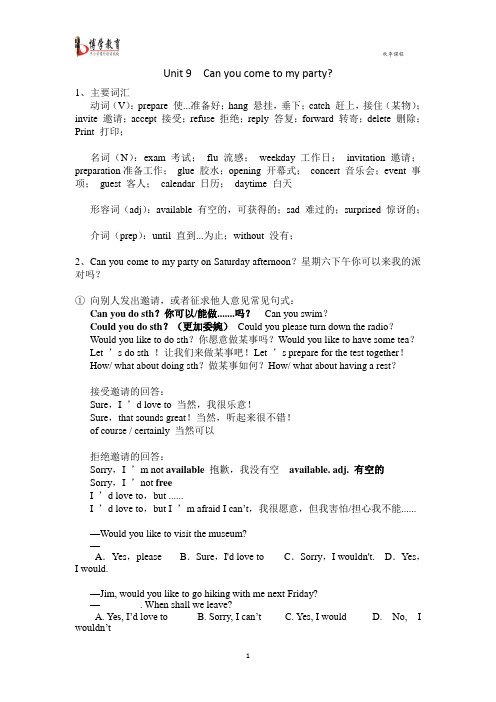
Unit 9 Can you come to my party?1、主要词汇动词(V):prepare 使...准备好;hang 悬挂,垂下;catch 赶上,接住(某物);invite 邀请;accept 接受;refuse 拒绝;reply 答复;forward 转寄;delete 删除;Print 打印;名词(N):exam考试;flu流感;weekday 工作日;invitation 邀请;preparation准备工作;glue 胶水;opening 开幕式;concert 音乐会;event 事项;guest 客人;calendar 日历;daytime 白天形容词(adj):available 有空的,可获得的;sad 难过的;surprised 惊讶的;介词(prep):until 直到...为止;without 没有;2、Can you come to my party on Saturday afternoon?星期六下午你可以来我的派对吗?①向别人发出邀请,或者征求他人意见常见句式:Can you do sth?你可以/能做.......吗?Can you swim?Could you do sth?(更加委婉)Could you please turn down the radio?Would you like to do sth?你愿意做某事吗?Would you like to have some tea?Let ’s do sth !让我们来做某事吧!Let ’s prepare for the test together!How/ what about doing sth?做某事如何?How/ what about having a rest?接受邀请的回答:Sure,I ’d love to 当然,我很乐意!Sure,that sounds great!当然,听起来很不错!of course / certainly 当然可以拒绝邀请的回答:Sorry,I ’m not available抱歉,我没有空available. adj. 有空的Sorry,I ’not freeI ’d love to,but ......I ’d love to,but I ’m afraid I can’t,我很愿意,但我害怕/担心我不能......—Would you like to visit the museum?—______A.Yes,please B.Sure,I'd love to C.Sorry,I wouldn't. D.Yes,I would.—Jim, would you like to go hiking with me next Friday?—________. When shall we leave?A. Yes, I’d love toB. Sorry, I can’tC. Yes, I wouldD. No, I wouldn’tTom______(can)come to my party because he is ill.②on Saturday afternoon在星期六下午在表示具体某天时,前面要用介词onOn weekend 在周末On Monday 在星期一On December 1st在12月1号On Wednesday morning/afternoon/evening 在周三早上/下午/晚上—My mother is ill.I have to look after her at home.—______.A.Thank you B.Oh,I don't know C.Bad luck D.I'm sorry to hear that3、prepare for an exam 为考试准备Prepare for... 为...而准备I can’t go with you because I have to prepare for the coming test我不能和你一起去,因为我必须得为即将到来的考试做准备Prepare sb for sth 使某人为某事做好了准备We must prepare ourselves for the meeting我们必须使我们自己为这次会议做好准备Prepare sth for sb 为某人准备好了某物Mom prepares a delicious meal for us 妈妈为我们准备了好吃的饭菜Prepare to do sth 准备做某事I prepare to take a trip in Taiwan 我准备去台湾旅游4、exam 是examination的缩写,意为“考试”Test ,也是“考试”的意思Take / have an exam 参加考试Pass the exam 通过考试/ 考试及格Fail the exam 考试不及格5、go to the doctor 去看医生6、Have the flu 患流感/感冒了Have的原意,“有”Have English class 上英语课Have breadfast 吃早餐Have a cold 感冒have a fever 发烧have a headache头痛Have a cough咳嗽have a sore throat喉咙痛have a toothache牙痛7、Sam isn’t leaving until next Wednesday 萨姆不会离开直到下周三为止萨姆下周三才会离开Until 直到......为止Not......until...... 不会做某事直到......为止直到......才......The noise didn’t stop until midnight 噪音直到午夜才停止She won’t forgive us until we say sorry to her 我们道歉前她是不会原谅我们的I waited until three o’clock 我们一直等到三点钟He lived with his parents until he got married 他结婚前一直和父母住在一起8、Can you hang out with us on Monday night?周一晚上你可以陪我们一起逛逛吗?Hang out with sb 和某人一起闲逛Hang out 闲逛/逛街He likes reading and he often hangs out in the bookstores他喜欢阅读所以经常在书店闲逛Hang,动词,“悬挂”,hang-hungHang the picture on the wall 把这幅画挂在墙上9、I’m afraid not 恐怕不能Afraid,形容词,意为“害怕的”否定时:I ’m afraid not 恐怕不能肯定时:I ’m afraid so 恐怕如此—Can you go to the concert?你能去听音乐会吗?—Sorry. I ’m afraid not 对不起,恐怕不能—Has she missed the bus?她错过公交了吗?—I ’m afraid so 恐怕如此/恐怕是这样没错10、invite,动词,意为“邀请”I nvite sb to sp,邀请某人到某地My pen pal invites me to his hometown 我笔友邀请我去他的家乡Invite sb to do sth,邀请某人做某事Mr.Kim invites us to have dinner with him 金先生邀请我们和他一起共用晚餐Invite(v)→invitation(n)邀请My best friend often invites me ______ delicious food.A.enjoy B.enjoying C.enjoyed D.to enjoy11、accept,动词,接受Accept的近义词是receive,但二者有所区别accept 与receive的区别:accept 意为“接受”指主观上原意接受receive 意为“收到”指客观上收到或拿到某样东西She accepted my apology她接受了我的道歉He received many letters from his family他收到很多来自家里的信件Receive letter from sb 收到某人的信I received his gift yesterday,but I wouldn’t like to accept it昨天我收到了他的礼物,但是我不想接受它12、refuse,动词,拒绝accept 的反义词Refuse sth 拒绝某物He rufused the invitation from Tony 他拒绝了Tony的邀请Refuse to do sth 拒绝做某事You should’t refuse to help her 你不应该拒绝帮助她13、the day before yesterday昨天(过去式)the day after tomorrow 后天(将来时)He went for Beijing the day before yesterday 他昨天去北京了Sarah will go for Beijing the day after tomorrow萨拉后天去北京—My father is coming back on Wednesday.—Oh, today is Monday, so you can see your father ______.A. todayB. the day before tomorrowC. tomorrowD. the day after tomorrow14、weekday 与weekendWeekday 工作日(周一至周五其中一天)Weekend周末(周六至周日)15、What ’s today?直译:今天是什么?引申:今天是什么日子?What ’s today?用来提问今天是几号、星期几。
人教版八年级上册英语Unit 9 知识点语法归纳总结
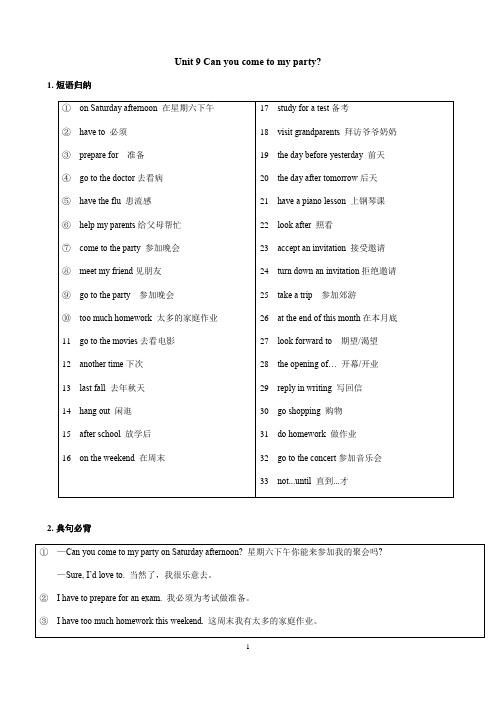
Unit 9 Can you come to my party?1.短语归纳2.典句必背3.用法集萃(1)—Can you come to my party on Saturday afternoon? 星期六下午你能来参加我的聚会吗?—Sure, I’d love to. 当然了,我很乐意去。
❖“Can you..?”可用来向别人发出邀请或询问对方能否做某事。
肯定答语是:Sure, I’d love to./Certainly./Of course, I can. 等。
否定答语常用:I’d love to, but I have to.../Sorry, I have to.../I’m sorry, I can’t. 等。
例:Can you go to the movies with me tonight? 今晚你能与我一起去看电影吗?Sure, I’d love to. 当然,我很乐意去。
(2)I have to prepare for an exam. 我必须为考试做准备。
❖prepare 意为“(为.....做准备;把....准备好”。
其用法如下:(3)I have too much homework this weekend. 这周末我有太多的家庭作业。
❖too much修饰不可数名词,用来强调其“量”超出了正常的范围。
too用来修饰形容词或副词,表示“太”的意思,其程度比very、so quite要强得多。
例:He sometimes finds his teacher leaves them too much homework to do.他有时发现老师留给他们做的家庭作业太多了。
I don’t want to eat too much food every day. 我不想每天吃太多的食物。
❖辨析(4)I remember we went bike riding together last fall when he visited you.我记得他去年秋天来拜访你的时候我们一起骑自行车兜风了。
人教版八年级上册英语 Unit 9 词汇和语法基础(解析版)
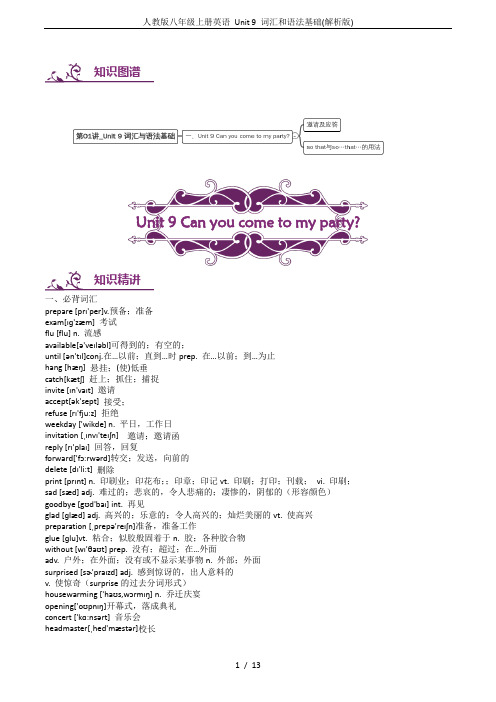
知识图谱Unit 9 Can you come to my party?知识精讲一、必背词汇prepare [prɪ'per]v.预备;准备exam[ɪɡ'zæm] 考试flu [flu] n. 流感available[ə'veɪləbl]可得到的;有空的;until [ən'tɪl]conj.在…以前;直到…时prep. 在…以前;到…为止hang [hæŋ] 悬挂;(使)低垂catch[kætʃ] 赶上;抓住;捕捉invite [ɪn'vaɪt] 邀请accept[ək'sept] 接受;refuse [rɪ'fjuːz] 拒绝weekday ['wikde] n. 平日,工作日invitation [ˌɪnvɪ'teɪʃn]邀请;邀请函reply [rɪ'plaɪ] 回答,回复forward['fɔːrwərd]转交;发送,向前的delete [dɪ'liːt] 删除print [prɪnt] n. 印刷业;印花布;;印章;印记vt. 印刷;打印;刊载;vi. 印刷;sad [sæd] adj. 难过的;悲哀的,令人悲痛的;凄惨的,阴郁的(形容颜色)goodbye [gʊd'baɪ] int. 再见glad [ɡlæd] adj. 高兴的;乐意的;令人高兴的;灿烂美丽的vt. 使高兴preparation [ˌprepə'reɪʃn]准备,准备工作glue [ɡlu]vt. 粘合;似胶般固着于n. 胶;各种胶合物without [wɪ'θaʊt] prep. 没有;超过;在…外面adv. 户外;在外面;没有或不显示某事物n. 外部;外面surprised [sɚ'praɪzd] adj. 感到惊讶的,出人意料的v. 使惊奇(surprise的过去分词形式)housewarming ['haʊs,wɔrmɪŋ] n. 乔迁庆宴opening['oʊpnɪŋ]开幕式,落成典礼concert ['kɑːnsərt] 音乐会headmaster[ˌhed'mæstər]校长event[ɪ'vent]大事,公开活动guest[ɡest] 客人calendar['kælɪndər]日历,日程表daytime ['detaɪm] n. 日间,白天二、重点词汇1. prepare verb /prɪˈpeər/to make or get something or someone ready for something that will happen in the future 准备,预备;把…准备好,使预备好1). Have you prepared for your interview?你作好面试的准备了吗?2). She'll prepare the food ahead of time and freeze it.她会提前准备好食物并冷冻起来。
人教版英语八年级上册Unit9 单元知识归纳总结
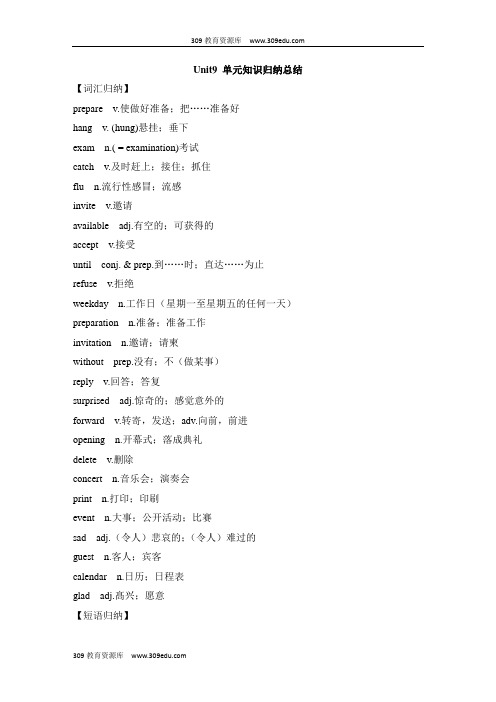
Unit9 单元知识归纳总结【词汇归纳】prepare v.使做好准备;把……准备好hang v. (hung)悬挂;垂下exam n.( = examination)考试catch v.及时赶上;接住;抓住flu n.流行性感冒;流感invite v.邀请available adj.有空的;可获得的accept v.接受until conj. & prep.到……时;直达……为止refuse v.拒绝weekday n.工作日(星期一至星期五的任何一天)preparation n.准备;准备工作invitation n.邀请;请柬without prep.没有;不(做某事)reply v.回答;答复surprised adj.惊奇的;感觉意外的forward v.转寄,发送;adv.向前,前进opening n.开幕式;落成典礼delete v.删除concert n.音乐会;演奏会print n.打印;印刷event n.大事;公开活动;比赛sad adj.(令人)悲哀的;(令人)难过的guest n.客人;宾客calendar n.日历;日程表glad adj.髙兴;愿意【短语归纳】prepare for为……做准备have the flu 患流感not... until 直到……才study for为……学习another time其他时间;别的go to the doctor 看医生hang out 闲逛;常去某处have to 必须,不得不the day before yesterday 前天reply to 回信the day after tomorrow 后天take a trip去旅行look after 照料;照顾go to a concert 去听音乐会look forward to 盼望;期待at the end of 在……结尾be sure 确信go shopping 去购物【典句必背】1.—Can you come to my party on Saturday afternoon?——星期六下午你能来参加我的聚会吗?—Sure, I’d love to.——当然了,我愿意去。
最全面人教版八年级上册英语第九单元知识点归纳总结
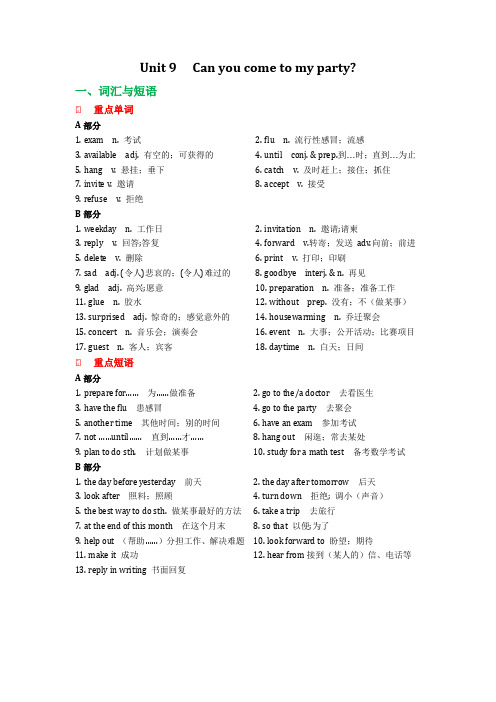
Unit 9 Can you come to my party?一、词汇与短语● 重点单词A部分1.exam n. 考试2.flu n. 流行性感冒;流感3.available adj. 有空的;可获得的4.until conj. & prep.到…时;直到…为止5.hang v. 悬挂;垂下6.catch v. 及时赶上;接住;抓住7.invite v. 邀请8.accept v. 接受9.refuse v. 拒绝B部分1.weekday n. 工作日2.invitation n. 邀请;请柬3.reply v. 回答;答复4.forward v.转寄;发送adv.向前;前进5.delete v. 删除6.print v. 打印;印刷7.sad adj. (令人)悲哀的;(令人)难过的8.goodbye interj. & n. 再见9.glad adj. 高兴;愿意10.preparation n. 准备;准备工作11.glue n. 胶水12.without prep. 没有;不(做某事)13.surprised adj. 惊奇的;感觉意外的14.housewarming n. 乔迁聚会15.concert n. 音乐会;演奏会16.event n. 大事;公开活动;比赛项目17.guest n. 客人;宾客18.daytime n. 白天;日间● 重点短语A部分1.prepare for…… 为……做准备2.go to the/a doctor 去看医生3.have the flu 患感冒4.go to the party 去聚会5.another time 其他时间;别的时间6.have an exam 参加考试7.not ……until…… 直到……才……8.hang out 闲逛;常去某处9.plan to do sth. 计划做某事10.study for a math test 备考数学考试B部分1.the day before yesterday 前天2.the day after tomorrow 后天3.look after 照料;照顾4.turn down 拒绝; 调小(声音)5.the best way to do sth. 做某事最好的方法6.take a trip 去旅行7.at the end of this month 在这个月末8.so that 以便;为了9.help out (帮助……)分担工作、解决难题10.look forward to 盼望;期待11.make it 成功12.hear from接到(某人的)信、电话等13.reply in writing 书面回复● 重点句子A部分1.--Can you come to my party on Saturday? --Sure, I'd love to.--周六你能来参加我的聚会吗?--当然,我想来。
人教版八年级上册英语Unit 9 知识点语法归纳总结

Unit 9 Can you come to my party?1.短语归纳2.典句必背3.用法集萃(1)—Can you come to my party on Saturday afternoon? 星期六下午你能来参加我的聚会吗?—Sure, I’d love to. 当然了,我很乐意去。
❖“Can you..?”可用来向别人发出邀请或询问对方能否做某事。
肯定答语是:Sure, I’d love to./Certainly./Of course, I can. 等。
否定答语常用:I’d love to, but I have to.../Sorry, I have to.../I’m sorry, I can’t. 等。
例:Can you go to the movies with me tonight? 今晚你能与我一起去看电影吗?Sure, I’d love to. 当然,我很乐意去。
(2)I have to prepare for an exam. 我必须为考试做准备。
❖prepare 意为“(为.....做准备;把....准备好”。
其用法如下:(3)I have too much homework this weekend. 这周末我有太多的家庭作业。
❖too much修饰不可数名词,用来强调其“量”超出了正常的范围。
too用来修饰形容词或副词,表示“太”的意思,其程度比very、so quite要强得多。
例:He sometimes finds his teacher leaves them too much homework to do.他有时发现老师留给他们做的家庭作业太多了。
I don’t want to eat too much food every day. 我不想每天吃太多的食物。
❖辨析(4)I remember we went bike riding together last fall when he visited you.我记得他去年秋天来拜访你的时候我们一起骑自行车兜风了。
人教版八年级英语上册Unit9知识点精讲
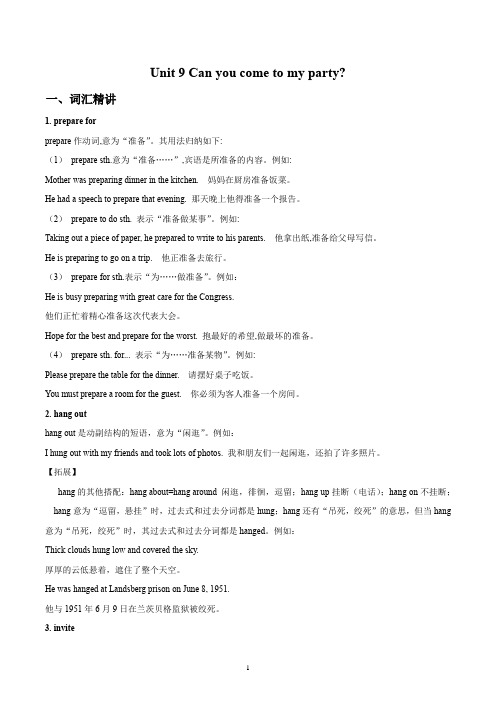
Unit 9 Can you come to my party?一、词汇精讲1. prepare forprepare作动词,意为“准备”。
其用法归纳如下:(1)prepare sth.意为“准备……”,宾语是所准备的内容。
例如:Mother was preparing dinner in the kitchen. 妈妈在厨房准备饭菜。
He had a speech to prepare that evening. 那天晚上他得准备一个报告。
(2)prepare to do sth. 表示“准备做某事”。
例如:Taking out a piece of paper, he prepared to write to his parents. 他拿出纸,准备给父母写信。
He is preparing to go on a trip. 他正准备去旅行。
(3)prepare for sth.表示“为……做准备”。
例如:He is busy preparing with great care for the Congress.他们正忙着精心准备这次代表大会。
Hope for the best and prepare for the worst. 抱最好的希望,做最坏的准备。
(4)prepare sth. for... 表示“为……准备某物”。
例如:Please prepare the table for the dinner. 请摆好桌子吃饭。
You must prepare a room for the guest. 你必须为客人准备一个房间。
2. hang outhang out是动副结构的短语,意为“闲逛”。
例如:I hung out with my friends and took lots of photos. 我和朋友们一起闲逛,还拍了许多照片。
【拓展】hang的其他搭配:hang about=hang around 闲逛,徘徊,逗留;hang up挂断(电话);hang on不挂断;hang意为“逗留,悬挂”时,过去式和过去分词都是hung;hang还有“吊死,绞死”的意思,但当hang 意为“吊死,绞死”时,其过去式和过去分词都是hanged。
人教版八年级上册英语-Unit-9单元知识点总结
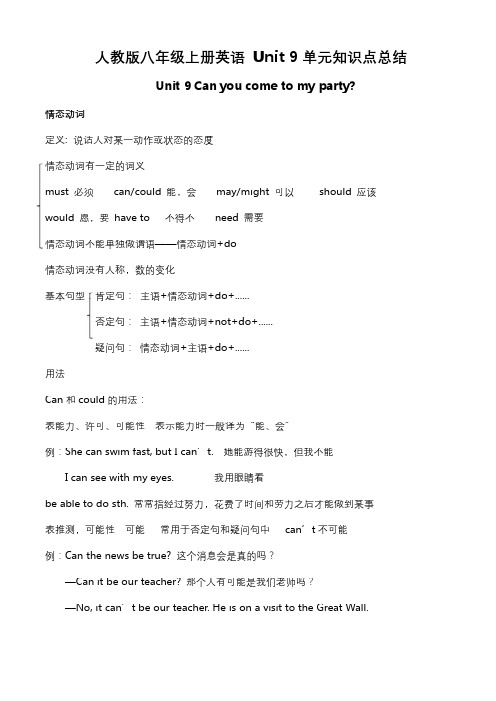
Unit 9 Can you come to my party? 情态动词定义: 说话人对某一动作或状态的态度情态动词有一定的词义must 必须can/could 能,会may/might 可以need 需要should 应该would 愿,要have to 不得不情态动词不能单独做谓语——情态动词+do情态动词没有人称,数的变化基本句型:肯定句:主语+情态动词+do+......否定句:主语+情态动词+not+do+......疑问句:情态动词+主语+do+......用法Can 和 could 的用法:表能力、许可、可能性表示能力时一般译为“能、会”例:She can swim fast, but I can’t.她能游得很快,但我不能I can see with my eyes. 我用眼睛看be able to do sth. 常常指经过努力,花费了时间和劳力之后才能做到某事表推测,可能性可能常用于否定句和疑问句中can’t不可能例:Can the news be true? 这个消息会是真的吗?—Can it be our teacher? 那个人有可能是我们老师吗?—No, it can’t be our teacher. He is on a visit to the Great Wall.could 在疑问句中,表示委婉的语气,此时could 没有过去式的意思例:—Could I use your pen? 我能用一下你的钢笔吗?—Yes, you can.可以(用 could 问,不能用 could 答。
)may 和 might 的用法表请求、许可,比 can 正式例:May I borrow your bike? 我可以借你的自行车吗?You may go home now. 现在你可以回家了表推测,谈论可能性可能,或许一般用于肯定句中may not 翻译为“可能不”例:It may rain tomorrow. 明天可能会下雨She may be at home. 她可能在家呢may 的过去式为 might ,表示推测时。
- 1、下载文档前请自行甄别文档内容的完整性,平台不提供额外的编辑、内容补充、找答案等附加服务。
- 2、"仅部分预览"的文档,不可在线预览部分如存在完整性等问题,可反馈申请退款(可完整预览的文档不适用该条件!)。
- 3、如文档侵犯您的权益,请联系客服反馈,我们会尽快为您处理(人工客服工作时间:9:00-18:30)。
人教版八年级英语上册Unit9知识点归纳
整理
人教版八年级英语上册Unit 9知识点归纳整理
Unit 9 an yu e t y party?
短语归纳
n Saturdayafternn在周六下午
prepare fr为……做准备
g t the dtr去看医生
have the flu患感冒
help y parents帮助我的父母
e t the party参加聚会
anther tie其他时间
last fall去年秋天
g t the party去聚会
hang ut常去某处;泡在某处
the day after trrw后天
the day befre yesterday前天
have a pianlessn上钢琴课
lk after照看;照顾
aept an invitatn接受邀请
turn dwn aninvitatin拒绝邀请
take a trip去旅行
at the end f this nth这个月末
lk frward t盼望;期待
the pening f………的开幕式/落成典礼
reply in writing书面回复
g t the nert去听音乐会
nt…until直到……才
eet y friend会见我的朋友
visit grandparents拜访祖父母
study fr a test为考试学习
have t不得不
t uh hewrk太多作业
d hewrk做家庭作业
g t the vies去看电影
after shl放学后
n the weekend在周末
invite sb. t d sth.邀请某人做某事
what引导的感叹句结构:hat+a/an+ad.+可数名词单数(+主语+谓语)!
hat+ad.+名词复数/不可数名词(+主语+谓语)!
help sb.(t)d sth.帮助某人做某事
be sad t d sth.做某事很悲伤
see sb. d sth. see sb.dingsth.
the best way t d sth.做某事最好的方式
have a surprise party fr sb.为某人举办一个惊喜派对
lk frward t ding sth.期盼做某事
reply t sth./sb.答复某事/某人
hat’s tday?今天是什么日子?
hat’s the date tday? hat day is it tday?
语法讲解
1、prepare意为“准备”,强调准备的动作与过程。
宾语是这一动作的承受者。
其后也可接双宾语,还可接不定式。
prepare fr sth. 为…准备好。
fr的宾语不是动作的承受者,而是表示准备的目的,即所要应付的情况。
/ prepare t dsth 准备做某事。
prepare 强调准备的动作与过程。
宾语是这一动作的承受者。
其后也可接双宾语,还可接不定式。
get/be ready意为“准备好”,强调准备的结果。
常见结构有:①beready(fr sth.)②getsth. ready ③be ready(fr sth)④be get ready t d(准备干某事,乐于干某事)
e _____ the id-ter exainatin. iss Li said, “Everyne shuld ______befrelass.
2. have the flu 患感冒, have a ld 感冒 ,have a ugh 咳嗽, have a fever 发烧 , have a sre thrat 喉咙痛, have
a headahe 头痛 ,have a tthahe 牙痛,
3. hang ut 常去某处,泡在某处, hang n 紧紧抓住, hang abut 闲荡, hang up 挂电话,悬挂,挂起
4. ath yu =see yu = bye bye ,ath a ld感冒 , ath sb’s eye引起某人注意, ath the train 赶上火车
ath up with =keep up with 赶上,跟上 ,ath hld f=take hld f 抓住
5.aept 接受 , 反义词为: refuse。
aept指主观上愿意接受,reeive 收到,指客观上收到或拿到,但主观上不一定会接受。
I reeived his gift yesterday, but I wuldn’tlike t aept it.
(1)turn dwn = refuse 拒绝 turn up 放大调高 turn ver 翻身 take turns 依次,轮流
(2)help sb.(t) d sth 帮助某人做某事 helpsb. with sth 在某方面帮助人 help neself t sth 随便吃
(3)at the end f 在…末尾,在…尽头, bythe end
f 到…末为止 in the end f 终于
6.surprised 形容词,感到意外的,主语是人be surprised t d sth 对做某事感到意外
surprising 形容词,令人惊讶的,主语是物 Thenews
was surpring.surprise 名词,惊奇、惊讶 t ne’s surprise 使某人吃惊,动词,使惊奇,使感到意外 It surprise sb t
d sth.
7.lk frward t 期待,盼望,t 是介词,后跟名词,代词或动名词作宾语。
hear fr sb. 收到某人的信 = reeive a letter fr sb.
hear f = hear abut 听说
8.ake it 在约定的时间内到达,能够 = arrive in tie; Glad yu uldake it.
商量确定的时间,表示将某项计划的安排,后接时间状语。
Let’s ake it at seven ’lk n Tuesday.
成功办成某事 = sueed After yearsf hard wrk, he finally ade it.
9.reply 回答,指用口头或书面形式回答,不及物动词reply t sb/sth. 对…..作出回答。
作及物动词,意为回答,回答说。
作名词,意为:答道,回信,答复,后跟介词 t .
answer 是最普通的用语,包括口头,书面或行动的回答,可作及物和不及物动词。
